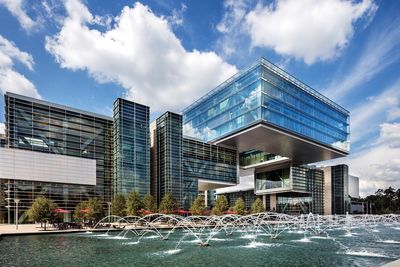
The offshore site is adjacent to a CO2 pipeline network that ExxonMobil acquired in 2023 with its $4.9 billion purchase of Plano-based Denbury Resources. Photo via ExxonMobil.com
Spring-based ExxonMobil continues to ramp up its carbon capture and storage business with a new offshore lease and a new CCS customer.
On October 10, ExxonMobil announced it had signed the biggest offshore carbon dioxide storage lease in the U.S. ExxonMobil says the more than 271,000-acre site, being leased from the Texas General Land Office, complements the onshore CO2 storage portfolio that it’s assembling.
“This is yet another sign of our commitment to CCS and the strides we’ve been able to make,” Dan Ammann, president of ExxonMobil Low Carbon Solutions, says in a news release.
The offshore site is adjacent to a CO2 pipeline network that ExxonMobil acquired in 2023 with its $4.9 billion purchase of Plano-based Denbury Resources.
Ammann told Forbes that when it comes to available acreage in the Gulf Coast, this site is “the largest and most attractive from a geological point of view.”
The initial customer for the newly purchased site will be Northbrook, Illinois-based CF Industries, Forbes reported.
This summer, ExxonMobil sealed a deal to remove up to 500,000 metric tons of CO2 each year from CF’s nitrogen plant in Yazoo City, Mississippi. CF has earmarked about $100 million to build a CO2 dehydration and compression unit at the plant.
A couple of days before the lease announcement, Ammann said in a LinkedIn post that ExxonMobil had agreed to transport and annually store up to 1.2 metric tons of CO2 from the $1.6 billion New Generation Gas Gathering (NG3) pipeline project in Louisiana. Houston-based Momentum Midstream is developing NG3, which will collect and treat natural gas produced in Texas and Louisiana and deliver it to Gulf Coast markets.
This is ExxonMobil’s first CCS deal with a natural gas processor and fifth CCS deal agreement overall. To date, ExxonMobil has contracts in place for storage of up to 6.7 metric tons of CO2 per year.
“I’m proud that even more industries are choosing our #CCS solutions to meet their emissions reduction goals,” Ammann wrote on LinkedIn.
ExxonMobil says it operates the largest CO2 pipeline network in the U.S.
“The most fundamental thing we’re focused on is making sure the CO2 is stored safely and securely,” Ammann told Forbes in addressing fears that captured CO2 could seep back into the atmosphere.